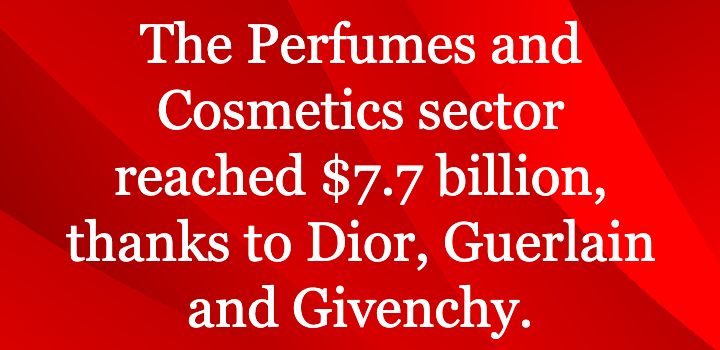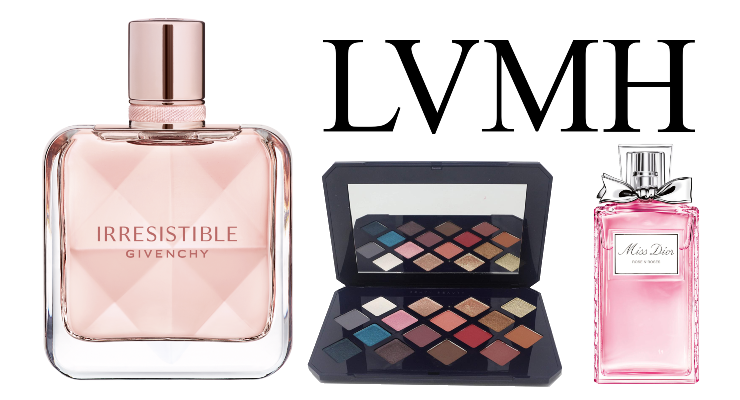Jamie Matusow, with Joanna Cosgrove10.30.20
Update: LVMH ranks at #9 on our latest report Top 20 Global Beauty Companies 2022.
LVMH is #7 on this year's list of Top Global Beauty Companies.
Below is a look at the company's 2020 highlights, recent acquisitions, best-selling brands, and latest innovations.
Corporate Sales
$60 billion
Beauty Sales (Perfumes & Cosmetics)
$7.7 billion
Key Personnel
Major Products
New Products

Comments
Luxury knows no limits. Net sales at LVMH Moët Hennessy Louis Vuitton, considered the world’s leading luxury products group, rose 15% in 2019, to reach $60 billion. Growth was strong in Europe and the United States, as well as Asia, which was dealing with the difficult situation in Hong Kong in the second half of 2019.
The Perfumes and Cosmetics sector rose 12% to reach $7.7 billion, attributing the success to its flagship brands, especially Dior, Guerlain and Givenchy. Skin care sales rose, due mostly to increased demand in Asia. Christian Dior continued to outpace the market. In addition to the strength of the Group’s iconic perfumes J’adore, Miss Dior and Sauvage, makeup and skin care also made significant contributions. Guerlain’s growth accelerated and the brand enjoyed excellent success with Abeille Royale in skin care and Rouge G in makeup. Parfums Givenchy achieved another year of strength thanks to its makeup and its L’Interdit perfume. Fresh, Fenty Beauty by Rihanna and Acqua di Parma also showed quickfire growth.
In the Selective Retailing business group, Sephora continued to gain market share. Growth was particularly strong in Asia and the Middle East. Online sales rose rapidly throughout the world, with an increasingly international clientele.
2020 Highlights
In February, with the economy still upbeat and relatively Covid-19 free, Sephora announced it would be opening 100 stores in North America, in 75 cities, bringing the total number of stores in the region to 600.
In March, as the coronavirus pandemic escalated, Sephora closed all retail stores in the U.S. and Canada.
At the same time, LVMH changed over three of its factories from perfume to hand sanitizer—the first beauty company to make the switch—as a philanthropic effort supporting France’s hospital system. Christian Dior, Givenchy and Guerlain manufacturing facilities began producing a hydroalcoholic gel hand sanitizer formula that was approved by French authorities as effective against the coronavirus. LVMH reportedly delivered 12 tons the first week.
The much-anticipated skin care launch from Rihanna, in partnership with Kendo Brands, an LVMH-owned beauty developer, brought the arrival of Fenty Skin in July. Fenty Skin features “clean, value-packed, multitasking products that work seamlessly with makeup and respect the planet with earth-conscious packaging and formulas.”
Second Half 2020
LVMH reported revenue of $20.7 billion in the first half of 2020, down 27% compared to the same period in 2019.
In the second quarter, as the virus shrank in Asia, China, especially, began showing an improvement in trends, with a strong rebound.
Sales of Perfumes and Cosmetics for the second half of 2020 plummeted 27% to $2.6 billion, from the first half of 2019.
Online sales grew steadily. Parfums Christian Dior maintained strong momentum for innovation with launches of Miss Dior Rose N’Roses and the new edition of Dior Homme, as well as the success of Capture Totale anti-aging skin care. Guerlain continued its rapid growth in skin care, thanks to Abeille Royale and Orchidée Impériale. Parfums Givenchy was resilient. The Fresh skin care brand did well in China.
Looking Ahead
In these uncertain times, LVMH says it will maintain a strategy focused on preserving the value of its brands, based on the exceptional quality of its products and the responsiveness of its teams. Additionally, “the impact of the epidemic on revenue and annual results cannot be precisely assessed at this stage without knowing the timetable for the return to normal business in the different areas where the Group operates. After a second quarter severely affected by the crisis, we can hope that the recovery will materialize gradually in the second half.”
In late September, Sephora announced the launch of four new “green” labels: Good For You, Good For A Better Planet, Good For Vegan and Good For Recycling.
Read Next: Beiersdorf is #8
LVMH is #7 on this year's list of Top Global Beauty Companies.
Below is a look at the company's 2020 highlights, recent acquisitions, best-selling brands, and latest innovations.
Corporate Sales
$60 billion
Beauty Sales (Perfumes & Cosmetics)
$7.7 billion
Key Personnel
- Bernard Arnault, chairman and CEO of LVMH Moët Hennessy
- Antonio Belloni, group managing director
- Nicolas Bazire, development and acquisitions
- Chris de Lapuente, Sephora and Beauty
Major Products
- Guerlain, Acqua di Parma, Parfums Christian Dior
- Givenchy Paris, Perfumes Loewe, Benefit Cosmetics
- Make Up For Ever, Kenzo Parfums, Fresh
- KVD Vegan Beauty, Marc Jacobs Beauty, Fenty Beauty
New Products
- Givenchy Irresistible, Miss Dior Rose N’Roses
- Capture Totale anti-aging skin care, Fenty Skin
- KVD Shake Eyeshadow Primer, Benefit Brow Microfilling Pen
- Make Up For Ever Aqua Resist Smoky Shadow Stick

Comments
Luxury knows no limits. Net sales at LVMH Moët Hennessy Louis Vuitton, considered the world’s leading luxury products group, rose 15% in 2019, to reach $60 billion. Growth was strong in Europe and the United States, as well as Asia, which was dealing with the difficult situation in Hong Kong in the second half of 2019.
The Perfumes and Cosmetics sector rose 12% to reach $7.7 billion, attributing the success to its flagship brands, especially Dior, Guerlain and Givenchy. Skin care sales rose, due mostly to increased demand in Asia. Christian Dior continued to outpace the market. In addition to the strength of the Group’s iconic perfumes J’adore, Miss Dior and Sauvage, makeup and skin care also made significant contributions. Guerlain’s growth accelerated and the brand enjoyed excellent success with Abeille Royale in skin care and Rouge G in makeup. Parfums Givenchy achieved another year of strength thanks to its makeup and its L’Interdit perfume. Fresh, Fenty Beauty by Rihanna and Acqua di Parma also showed quickfire growth.
In the Selective Retailing business group, Sephora continued to gain market share. Growth was particularly strong in Asia and the Middle East. Online sales rose rapidly throughout the world, with an increasingly international clientele.
2020 Highlights
In February, with the economy still upbeat and relatively Covid-19 free, Sephora announced it would be opening 100 stores in North America, in 75 cities, bringing the total number of stores in the region to 600.
In March, as the coronavirus pandemic escalated, Sephora closed all retail stores in the U.S. and Canada.
At the same time, LVMH changed over three of its factories from perfume to hand sanitizer—the first beauty company to make the switch—as a philanthropic effort supporting France’s hospital system. Christian Dior, Givenchy and Guerlain manufacturing facilities began producing a hydroalcoholic gel hand sanitizer formula that was approved by French authorities as effective against the coronavirus. LVMH reportedly delivered 12 tons the first week.
The much-anticipated skin care launch from Rihanna, in partnership with Kendo Brands, an LVMH-owned beauty developer, brought the arrival of Fenty Skin in July. Fenty Skin features “clean, value-packed, multitasking products that work seamlessly with makeup and respect the planet with earth-conscious packaging and formulas.”
Second Half 2020
LVMH reported revenue of $20.7 billion in the first half of 2020, down 27% compared to the same period in 2019.
In the second quarter, as the virus shrank in Asia, China, especially, began showing an improvement in trends, with a strong rebound.
Sales of Perfumes and Cosmetics for the second half of 2020 plummeted 27% to $2.6 billion, from the first half of 2019.
Online sales grew steadily. Parfums Christian Dior maintained strong momentum for innovation with launches of Miss Dior Rose N’Roses and the new edition of Dior Homme, as well as the success of Capture Totale anti-aging skin care. Guerlain continued its rapid growth in skin care, thanks to Abeille Royale and Orchidée Impériale. Parfums Givenchy was resilient. The Fresh skin care brand did well in China.
Looking Ahead
In these uncertain times, LVMH says it will maintain a strategy focused on preserving the value of its brands, based on the exceptional quality of its products and the responsiveness of its teams. Additionally, “the impact of the epidemic on revenue and annual results cannot be precisely assessed at this stage without knowing the timetable for the return to normal business in the different areas where the Group operates. After a second quarter severely affected by the crisis, we can hope that the recovery will materialize gradually in the second half.”
In late September, Sephora announced the launch of four new “green” labels: Good For You, Good For A Better Planet, Good For Vegan and Good For Recycling.
Read Next: Beiersdorf is #8




























